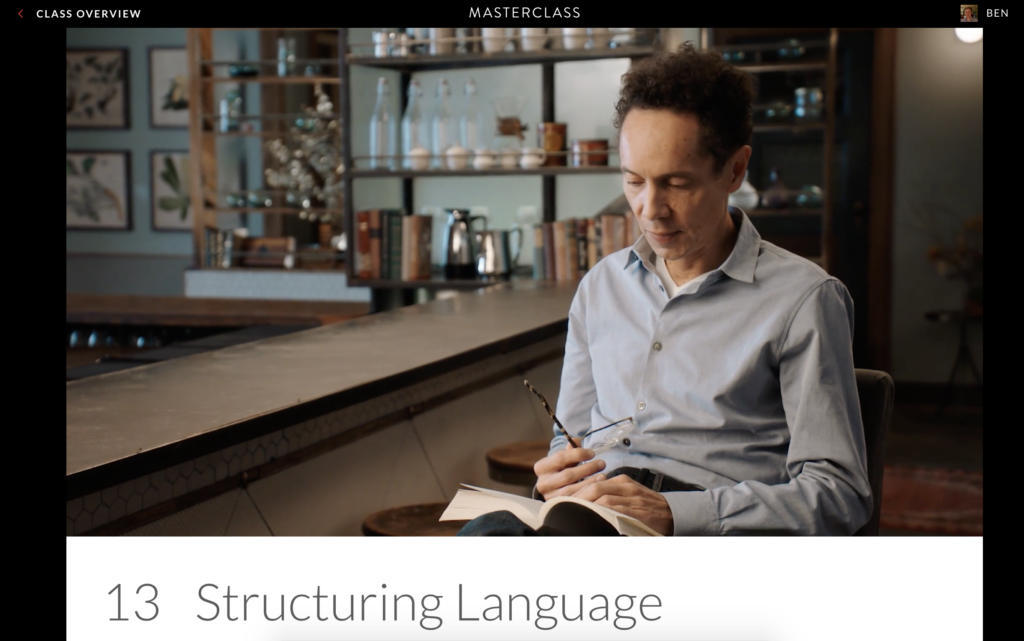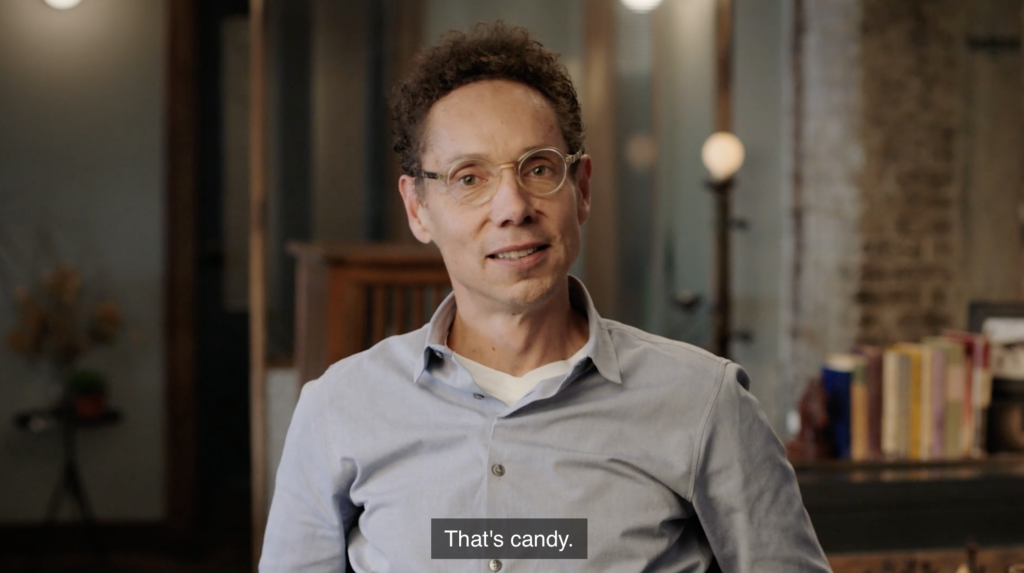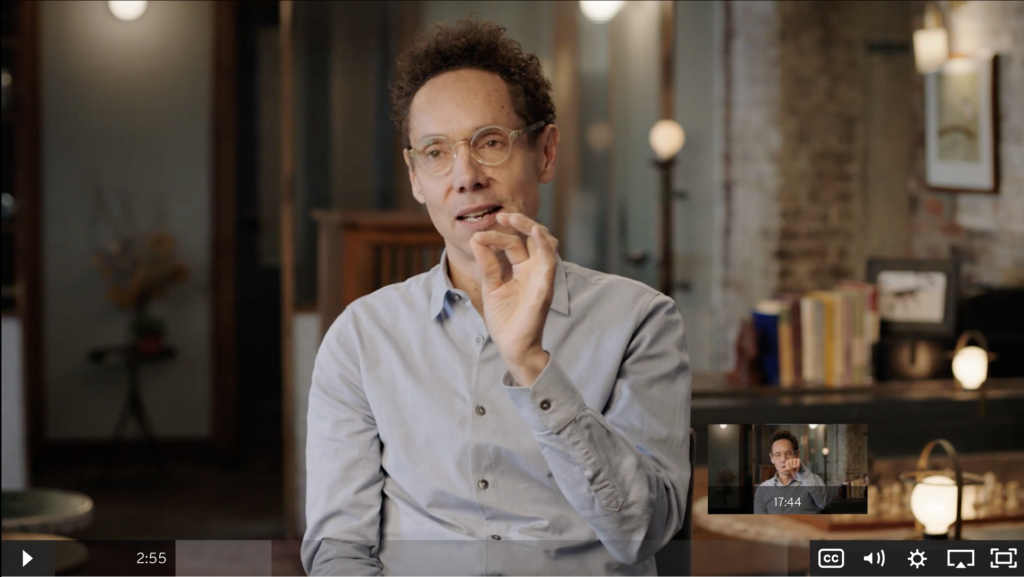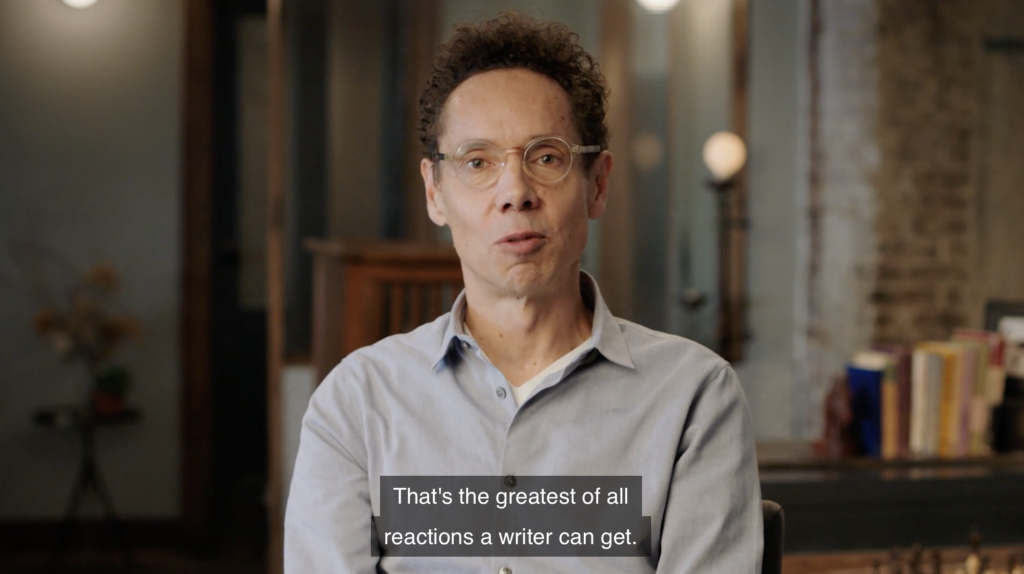The Malcolm Gladwell Teaches Writing MasterClass might just be the best non-fiction writing course on the internet. I’m not just saying that because Malcolm Gladwell is one of my personal writing heroes. I would have gotten reams of insights out of this course, and had a blast doing so, even if I hadn’t already enjoyed all of Gladwell’s books.
This review will give you my thoughts on the Malcolm Gladwell MasterClass but if you’re a writer and you haven’t checked out MasterClass yet – seriously, go check it out now. There is nowhere else on the internet where you can learn writing from Malcolm Gladwell, R.L. Stine, James Patterson, Aaron Sorkin, Shonda Rhimes, David Mamet, Judy Blume, Judd Apatow, Steve Martin, and Bob Woodward for a crazy low price.
Here’s My Malcolm Gladwell Teaches Writing MasterClass Review
I always learn so much from these MasterClass courses.
But the Malcolm Gladwell Teaches Writing MasterClass was the first one where I found myself furiously scribbling tons of notes within the first few minutes.
A few minutes in and I had so many ideas sparked that I knew the course was worth the purchase. As someone looking to up my non-fiction writing game, Gladwell’s lessons made me think in ways I hadn’t before.
I always take notes but these notes were special. I was learning stuff I’ve never learnt before.
After years of devouring hundreds of books and taking tons of courses on the craft of writing, I thought I’d learnt everything about the subject. But Malcolm Gladwell schooled me hard and dropped knowledge bombs with every breath.
If you’re feeling hesitant about enrolling because you’re not sure if you’ll learn anything knew, let me dispel that idea right now.
You will learn a lot of new stuff you can immediately apply to your writing. You’ll think about different aspects of writing in ways you’ve never considered before. And you’ll be highly motivated by Gladwell’s infectious passion, which will drive you to write faster and with more joy than ever before. No exaggeration.
What you get in the Malcolm Gladwell Writing Masterclass
There are currently close to 5 hours of video footage: Malcolm Gladwell talking directly to you in long-form video modules (each one about the length of a TV show) on subjects such as crafting tone and voice, structuring language, and holding readers’ attention.
More content will come soon in the form of Malcolm Gladwell answering student questions in the ‘Office Hours’ part of the MasterClass hub. At the moment (April 2018), the course is still in the Early Access stage. Although not officially open, if you enrol now, you’ll get complete access. And you can ask Mr Gladwell anything you want about writing and he might answer it! How awesome is that?
There are 24 video modules broken down into different exciting writing topics. I got a crazy amount of value from all of them. I seriously filled up an entire notebook and also made a huge Scrivener file of quotes, notes, and ideas for my own work. Some of my personal favourite modules included:
- Jargon
- How to Read
- Who to Read
- Structuring Language
- Humour and Melancholy
- Characters: World Building
- Holding Readers: Tools for Engagement
- Developing the Story: Analogous Worlds
- Structuring the Narrative: The Imperfect Puzzle
It’s impossible to choose an actual favourite module because the course works so perfectly as a whole. Gladwell is buzzing with energy from the first minute until the very last – and it rubs off on you. I found my coffee (a substance I’m highly dependent on) was left unattended and completely unnecessary beside me. Malcolm Gladwell was more invigorating than a shot of caffeine.
In addition to the video modules, you also get access to this awesome workbook crammed with homework assignments and further reading. The workbook aims to have you complete a class project by the end of the course. If you’re following along with the writing assignments and doing all of the homework, you’ll have a 7,000-8,000-word New Yorker-style non-fiction report that is ready to pitch to a big magazine or newspaper.
Malcolm Gladwell easily ranks as one of the best MasterClass instructors
I’ve been privileged to have studied under many world-class writing teachers in my time. Professors of Poetry and prestigious prize winners from Oxford University. And also many of my heroes already teaching in the MasterClass catalogue.
But I knew within the first few minutes of this MasterClass, that Malcolm Gladwell was one of the best teachers of language and non-fiction narrative I’ve ever encountered.
If I had to give a handful of reasons why Mr Gladwell is such a great teacher, they’d probably be because:
- Gladwell gets straight into the substance of craft and dives straight into how to hold readers’ attention and techniques for structuring narrative in compelling ways instead of recounting his personal history.
- He is focused like laser on how to make us better writers. There’s no ego or useless chest-puffing here (which happens annoyingly often in lesser courses with no-name instructors). Gladwell knows how to make us better and also how to communicate his lessons in concise and memorable ways.
- His insights into writing, narrative, language, and art are paradigm shifting. If you’ve ever experienced a mental gear shift in your brain from a great teacher, you already know how valuable this is. I experienced countless paradigm shifts during this MasterClass.
- Gladwell’s lessons are memorable, immediately applicable to what we’re working on, and endlessly entertaining. The re-watch value is enormous and every minute is bursting with value.
I was feeling a bit despondent about my own work when I started this course. I was in a writing slump. But Malcolm Gladwell got me through it very quickly and got me back on track.
That’s the mark of a great course. This MasterClass is phenomenal value for money and I can see it as being incredibly educational to writers at all stages of their career: beginner, intermediate, expert, published, unpublished, fiction, non-fiction – everyone can learn something.
Things I loved about the Malcolm Gladwell Teaches Writing MasterClass
There is way too much in the Malcolm Gladwell MasterClass to recount everything or do any of it justice in a small review article. But here are a few things I’m currently pondering and implementing in my own writing thanks to Mr Gladwell.
I’m thinking about how stories don’t have to be wrapped up perfectly in the end.
Imperfect analogies and arguments draw you in. When you introduce your readers to a puzzle they need to unravel, you don’t want to give them a perfect solution when you close the narrative.
You want your narratives to be a little bit odd because that attracts attention and makes people talk about it. We’re drawn to those things that are done well but we’re also drawn to those things that are done imperfectly. As writers, we want that response. We want to do something that mildly irritates the reader.
You want ‘aftertaste’, as Gladwell says. And that comes from not having everything being perfectly blended together.
What do people find interesting? What does the writer find interesting? Interesting is not perfection.
I’m also thinking about making promises in my writing that I don’t keep.
I’ve always had the goal of being neat and tidy in my work. But Gladwell doesn’t have that goal. He is more interested in mess. Someone can work through a problem imperfectly or even fail at the task they set out to do, but if the failure’s interesting, he’s fine with it.
Being interesting is the most important goal. Being complete or truthful to your intentions are not the same as being interesting.
I’m also thinking about creating frustration in my readers and transferring responsibility for solving the puzzle I construct from me to the reader.
I’m thinking about how I might implement what Gladwell calls ‘candy’ in my writing. Treats to reward the reader for paying attention.
I’m thinking about creating analogies that clarify jargon and make the reader feel like an expert when handling data (e.g. Gladwell shows how he makes his layman readers feel like oncologists in one of his pieces).
I’m thinking about how to enhance my narrative through withholding information, how to enhance character description in just a few carefully chosen and conflicting descriptors, and how to produce laughter and levity in my audience in the same piece.
And so much more.
I got so much out of this MasterClass. But if I could sum it up in just one sentiment it would be this:
I ended the Malcolm Gladwell MasterClass feeling much smarter than I went in. And that, at least for me, makes for a very worthy use of my time and money.
If you have even a passing interest in writing, I highly recommend you check out this MasterClass. If you go for the All Access Pass, you can tap into the genius of many world class experts in all fields of creative endeavour.
Let me know what you think of the MasterClass and if you elevated your thinking as much as it did mine.




